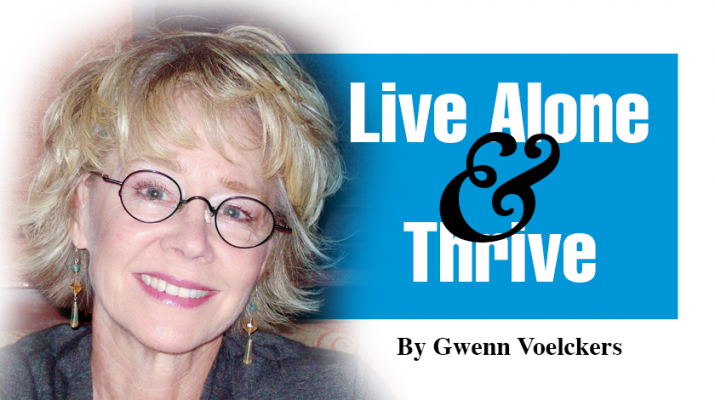Practical tips, advice and hope for those who live alone
By Gwenn Voelckers
I recently saw the new film “The Life of Chuck” and I haven’t stopped thinking about it. It’s one of those rare, thought-provoking movies that stays with you.
If you’ve seen it, you know what I mean. If you haven’t yet, I won’t spoil it. But I will share that it’s a story about life and death and time. And how fleeting and precious it all is.
It’s about how our memories, the choices we make and how the moments we share can shape our lives and the lives of others.
I was especially drawn to the film’s emphasis on letting go of fear.
It shows us, in so many touching and entertaining ways, how overcoming fear — of death, of change, of aging or of being alone — allows us to live more fully.
As someone navigating life on my own in my later years this message resonated with me.
Perhaps it will for you, too.
The Choices We Make
One of the film’s most powerful ideas is that our lives are not defined by grand achievements or dramatic moments, but by the quiet choices we make, day in and day out.
I wasn’t quite sure what the movie was about at first, but afterward, its message became very clear: that the way we live, love each other and show up is what gives our lives meaning.
Chuck wasn’t a superhero. He wasn’t famous. But he mattered deeply to the people who knew him.
In one movie scene, Chuck dances — just for the joy of it — and the people watching him are totally captivated and enchanted. I was, too!
Chuck is not performing. He’s not trying to impress anyone. He’s just being fully present in a moment of sheer joy. His one small, spontaneous act ignited happiness. It reminded me that we don’t need to be wealthy or wildly accomplished to make an impact.
Sometimes all it takes is making a choice — to dance, listen, be honest, be kind and show up with red balloons.
The Memories We Carry
Another theme that ran through the film — and through my own thoughts as I left the theater — was how much memories matter. Not in an overly nostalgic or clinging way, but as a reminder of where we’ve been and who we are.
Chuck’s life, in the end, is captured in memories that might seem insignificant at first: conversations with his grandparents, a childhood friend’s nod of approval, encouragement from his dance teacher. But each of those moments made a difference.
It made me think about my own memories, especially of loved ones, now gone, and how I remember and honor them.
After my father’s passing, I acquired some of his Craftsman hand tools. I love using these time-worn tools and am reminded of my dad’s impact on my life every time I fearlessly tackle a home repair project.
I cherish the memories his tools evoke.
We are not alone when we carry the people we love in our hearts. And on our own, we get to choose how we incorporate our memories of them into our lives.
The Way We Live
Here are six simple, doable ways to bring the spirit of “The Life of Chuck” into your daily experience:
• Choose Life Over Fear — When fear rises up (fear of socializing solo, loneliness, being forgotten), try asking, “What would I do right now if I weren’t afraid?” Then do just one thing.
Courage grows with practice.
When I was afraid to show up at events alone, I decided to “practice” with a small neighborhood picnic. I repeated my mantra: “All I need is within me now.” And walked in with a goal to be curious about others.
I made a beeline for the hostess and offered my help, which got the ball (and my confidence) rolling. I had a great time!
• Notice What’s Beautiful — You don’t need a dramatic canyon view or tropical sunset. Pause for a moment to marvel at a cloud formation, a stranger’s smile in passing, the way your dog crosses his paws, children’s laughter in the distance or spotting a ’57 Chevy … whatever is in front of you.
Noticing is at the core of this movie. Make it a ritual: pick one beautiful thing to notice each day and think to yourself, “This is lovely.”
• Talk to the People You Love — Now — The film reminds us how fleeting life can be. Don’t wait for others to call. Pick up the phone. Send a text. Initiate a family Zoom call. I like to go old-school with snail mail.
Connection doesn’t require a big gesture, just a little intention.
Staying connected is one of the most powerful ways to feel less alone and more part of the world.
• Let Go of What No Longer Serves You — Worry, regret, self-blame — they can take up way too much space in our heads and solo lives. When did worrying or regret about anything ever change the outcome? Never.
Instead, channel Chuck’s example and let go of those things you cannot control and focus on supporting those you love (including yourself) with patience, empathy and loving attention.
Relish the freedom and lightness that follows. Along with a scoop of ice cream!
• Accept What Is — One of the film’s most poignant themes is acceptance. Not resignation, but acceptance of what is and finding grace in it.
The truth is, living solo in your 50s, 60s or beyond often requires a new way of showing up in the world. There’s grief, yes; but there’s also opportunity. Opportunity to slow down and reconnect with yourself.
For me, that shift required giving myself permission to be. Not to be productive all the time (some days I just don’t feel like practicing the drums). Not to be cheerful or social if I don’t feel like it. Just to be — quiet, curious, uncertain — and to know that it’s enough.
• Live a Life You’re Proud Of — Chuck’s life isn’t about fame or achievement. It’s about love, meaning and moments. Ask yourself: what brings me joy? What matters to me? How can I be of help to others? And the best friend possible?
Then organize your days accordingly.
You don’t have to change the world — you already do, in small, deliberate and meaningful ways. These can be your lasting legacy.
The People We Become
“The Life of Chuck” reminds us that life doesn’t stop unfolding just because we’re older, single or living alone. There’s still beauty. Still laughter. Still time. Still love — in all its many forms.
So if you’re living life solo — whether recently or for some time now — take heart. Your story isn’t over. In fact, this new chapter may hold more freedom, joy and wonder than you ever imagined.
Embrace it!
 Gwenn Voelckers is a certified life coach (CLC), columnist and author of “Alone and Content,” a collection of inspiring essays for those who live alone. She welcomes your comments, questions, and inquiries at gvoelckers@rochester.rr.com
Gwenn Voelckers is a certified life coach (CLC), columnist and author of “Alone and Content,” a collection of inspiring essays for those who live alone. She welcomes your comments, questions, and inquiries at gvoelckers@rochester.rr.com

